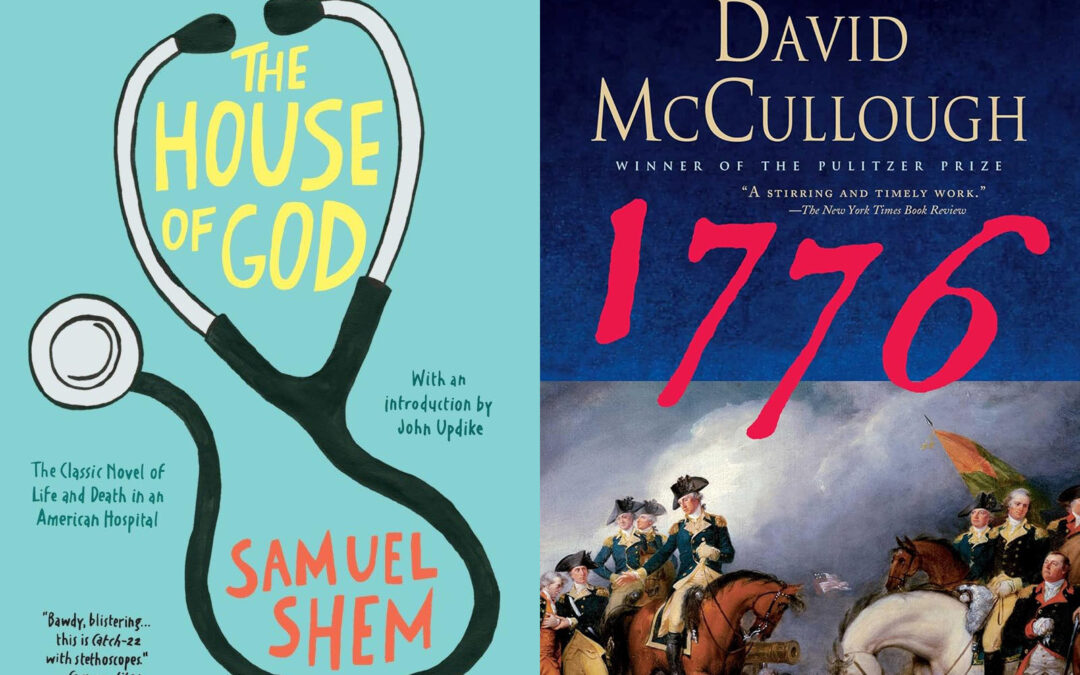6 fantastic novels doctors recommend for your summer reading list | American Medical Association
The American Medical Association (AMA) recommends reading novels as a way to reduce physician burnout. I have read most of the books on the AMA’s list of great fiction and am amused by the continuing popularity of The House of God, which was read by every medical student in my day, 40 years ago. I became hooked on audiobooks during the years in which I had a long commute to the Houston Medical Center – back in the days when you had to buy CDs or audiotapes. In my CD audiobook days, I was so entranced with David McCullough’s brilliant 1776, that I looked for excuses to run errands in the car. Returning home one night at 3 AM after treating a carbon monoxide poisoning case, I sat in the driveway listening to his Truman. My father had been willing to talk about his grim experiences in the South Pacific during WWII but rarely spoke about the Korean War — other than to say it was the coldest he had ever been in his life. He was on that tragic winter retreat during which soldiers froze to death. Like most of my generation, I learned nothing about the Korean War in school, and the account of that retreat in Truman was so gripping, I sat in my car sobbing, just thinking about what my father endured. If you want to be encouraged, don’t miss Mornings on Horseback, the biography of Theodore Roosevelt. Thanks to smart phones, I can “read” non-stop whenever I am not working. I confess that when I need to escape in fiction, my taste is likely to be a “cozy mystery,” Alan Bradly’s Flavia DeLuce series, Laurie King’s beautifully crafted Mary Russell series or one of CS Lewis’ allegorical tales like The Space Trilogy.
All of Malcolm Gladwell’s books are good for both the intellect and the soul. My favorite is David and Goliath: Underdogs, Misfits, and the Art of Battling Giants. Through what seem initially to be unconnected stories, you realize that what might be perceived as a major disadvantage in life turns out to be the key to success. The story of Jay Freireich and his battle against childhood leukemia should be required reading for medical students. If you are interested in hyperbaric medicine, read or listen to The Great Bridge: The Epic Story of the Building of the Brooklyn Bridge by David McCullough. The chief engineer, Washington Roebling became bedridden from a case of spinal cord decompression sickness (“caisson’s disease”) and the project could not have been completed without his wife, Emily Warren Roebling, who supervised the construction and served as the liaison between her husband and the construction workers – an extraordinary role for a woman in the Victorian era.
It’s impossible to keep up with the reading list of Dr. Mark Melin, but I am trying. I credit Mark with a book recommendation that has changed how I think about data and my own research. The Undoing Project: A Friendship That Changed Our Minds by Michael Lewis, has made me think differently about decision making and the interpretation of data. That book led me to The Theory That Would Not Die: How Bayes’ Rule Cracked the Enigma Code, Hunted Down Russian Submarines, and Emerged Triumphant from Two Centuries of Controversy by Sharon Bertsch McGrayne, and has provided the template for a new approach to real-world data on wound healing.
Let me know what you are reading these days.

Dr. Fife is a world renowned wound care physician dedicated to improving patient outcomes through quality driven care. Please visit my blog at CarolineFifeMD.com and my Youtube channel at https://www.youtube.com/c/carolinefifemd/videos
The opinions, comments, and content expressed or implied in my statements are solely my own and do not necessarily reflect the position or views of Intellicure or any of the boards on which I serve.




“Coded Justice” by Stacy Abrams. AI and Medicine.